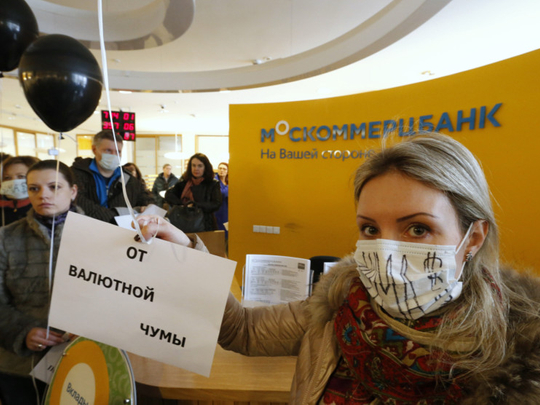
Before he left Russia at the end of 2014, Sayidhuja Rizoyev used to make up to $40 (about Dh146) a day as a construction worker. Then his boss decided not to renew his contract, and he returned home to ex-Soviet Tajikistan.
Now the 31-year-old father of one earns about $6-7 a day selling small items such as batteries in the capital Dushanbe.
“So far, this has been enough to make ends meet,” said Rizoyev.
The collapse in world oil prices to 12-year lows has crippled the economy of Russia, which shrank last year by nearly 4 per cent, while its rouble currency has lost almost 60 per cent of its value against the dollar since mid-2014.
The small handful of other former Soviet states that also export oil have also been hit: police in Azerbaijan, which posted some of the fastest economic growth rates in the world a decade ago during an oil boom, have lately had to use force to break up protests as growth has stalled.
But for ordinary civilians, the economic damage may be severest of all in the outposts of the former Soviet Union that have no energy resources of their own to sell, stayed poor while Russia grew richer and now lack stashes of accumulated petrodollars to cushion the impact.
The oil price crash has been felt in countries as far-flung as Tajikistan, Moldova, Belarus and Armenia. Kyrgyzstan’s som currency dropped 22.4 per cent against the dollar. Georgia’s economic growth nearly halved last year.
For many of the small countries at the fringes of the old Soviet empire, the main export has been citizens, who toil abroad mainly in Russia as informal labourers. Such workers have lost jobs or seen the remittances they send home drop in value.
Political tensions
A tiny country in central Asia on the old Soviet frontier with Afghanistan, Tajikistan relies on remittances from workers abroad for about 45 per cent of its gross domestic product, according to the International Monetary Fund.
Migrant workers in Russia often have put up with sordid living conditions, racial discrimination and shakedowns by officials, but it is worth it because they earn more money than would be possible at home.
That calculation is now changing. Abduzohir Soatov said he had been working in Russia but came home because of the slowdown in the Russian economy.
“It no longer makes sense,” he said.
Tajikistan’s somoni currency lost 24 per cent of its value against the dollar last year according to the official exchange rate, and more on the cash market. Central bank reserves cover only 1.7 months of imports, a precariously low level by international standards.
Economic woes translate into concerns about political stability in countries that mostly failed to build democracies after the Soviet Union split up.
Tajikistan is still run by its Soviet-era Communist boss, President Imomali Rakhmon, whose allies plan to hold a referendum that will allow him to run for president for an unlimited number of terms. He faced a coup attempt last September led by his former deputy defence minister, who then died in a gun battle along with 37 of his supporters.
Such political tensions “are aggravated by the uncertain economic outlook”, said Deirdre Tynan, Central Asia project director at the International Crisis Group (ICG) think tank.
Farm machinery
Nearly 4,500 kilometres away in Belarus, on the edge of the European Union, similar economic hardship is being felt. The economy of the country, Russia’s closest ally, shrank about 4 per cent last year while its currency lost nearly half its value against the dollar.
In the first 11 months of 2015, Belarus sent exports to Russia worth $3 billion, compared to $3.8 billion over the same period the year before.
Production of combine harvesters, traditionally sold to Russian farmers, was down 80 per cent last year.
“The state, companies, state enterprises have some accumulated capital, which for now allows them to postpone the descent into crisis. But the reserves won’t last for long,” said Yaroslav Romanchuk, head of the Mizes analytical centre.
“The number of bankruptcies this year will at some point start to increase exponentially.”
A Belarussian businessman, who spoke on condition of anonymity in a country where foreign media are treated with suspicion, said the crisis in Russia was already helping push down wages, which would affect consumer spending.
“For me, the moment of truth came when I saw a job ad a few days ago. A serious company was looking for a reasonably competent specialist and offered a [monthly] salary of $200,” said the businessman.
“Just two or three years ago we could not find a secretary for $500,” he said.




